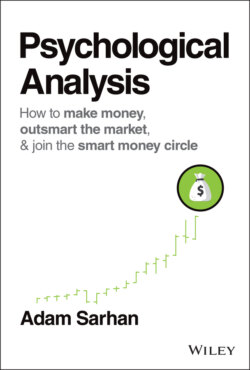Читать книгу Psychological Analysis - Adam Sarhan - Страница 32
PAIN AND PLEASURE
ОглавлениеNow let's jump into another timeless lesson I've learned along the way and how you can use it to join the smart money circle. When I was beginning my journey, I mistakenly thought that I had to follow what someone else did to be successful in the market.
In reality, that is not a winning approach on Wall Street. In fact, the exact opposite is true; just about every legendary trader and investor in history has established their own winning approach. The strategies I have developed work for me—based on my trading style. My clients take my work, adapt it to their own trading style, and profit from my ideas. Everything I share with you in this book is designed to open your mind's eye and help you reach a higher level of thinking so you can build on my work and develop your own winning approach.
For most people (folks in the dumb money circle), even if I told them exactly what to do—when to buy, when to sell, and when to hold—they couldn't follow the plan. They might see some minor losses, get scared, and dump a position too soon. Or they might get greedy and buy more of a stock that seems like it's on the rise only to realize they've risked too much when the price suddenly plummets. This is really big with systems traders—people who create algorithms that tell them when to buy and sell. Most systems traders fail, not because the system failed, but because they do not have the discipline to take the trades and follow the system! The reason this happens is because dumb money makes decisions based on emotions rather than logic.
To be successful in life and in the market, the first step is to prepare to win by having a well‐thought‐out plan. The second step is to be able to execute it, even when you don't feel like it and/or when the pressure is on. Do not take my word for it; look at this timeless quote from the 1700s:
By failing to prepare, you are preparing to fail.
—Benjamin Franklin
Let's illustrate this powerful point in a different way. Lots of people have trouble losing weight, and it's not because they don't know what to do. To lose weight, you have to burn more calories than you consume. It's a simple formula: calories in versus calories out. Yet, in the real world, as of 2020, 71.6% of adults in the United States were overweight, with four out of 10 registering as obese. Despite how simple weight management is on paper, people, it turns out, don't make logical decisions.
At this point, you might be asking yourself “why?” You see, it all comes down to our association with two driving forces behind almost all our decisions: pain and pleasure. Since the beginning of time, people have been programmed to avoid pain and seek pleasure; it is how our ancestors literally survived. People look at something and they, in a microsecond, instinctively think, “Does this give me pain or pleasure right now?” In most cases, if it triggers pain, they will avoid it, and if it gives them immediate pleasure, they will keep doing it.
Smart money knows that there are short, intermediate, and long‐term consequences to every decision we make. The dumb money is short‐sighted and only thinks about right now (short‐term consequences). The smart money takes the long view, plans ahead, and wins. In practice, something can give you pain in the short term but a tremendous amount of pleasure in the long term and vice versa. Food is the easiest way to explain this timeless lesson because it is something we can all relate to.
You see, people like to eat because it provides immediate, short‐term pleasure, and they do not like to exercise because, for the untrained mind, it triggers instant short‐term pain. That's why most people are overweight. People who are in shape do the exact opposite; they learn how to rewire their brains, and associate pleasure with sweating and pain with eating cookies. Why? Because they are looking at the long‐term consequences of their actions, not the short‐term ones. Once you are aware of this dynamic, you can change it, and, more importantly, control it. The easiest way to do that is to focus on the long‐term consequences. If that activity gives you long‐term pleasure, go ahead and do it.
